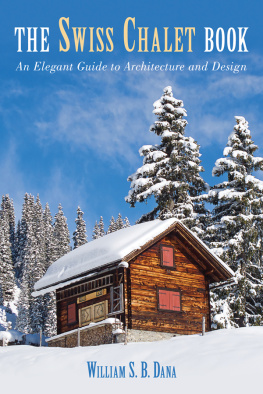
THE AUTHOR
Frederick Hale graduated from Macalester College in 1969 and was awarded masters degrees at Harvard University, the University of Minnesota, and the Johns Hopkins University. He received his Doctor of Philosophy at Johns Hopkins in 1976. He is the author of Danes in Wisconsin (revised in 2005) and Swedes in Wisconsin (revised in 2002), both published by the Wisconsin Historical Society Press. Hale has written four books in the field of Scandinavian immigration and has contributed articles to historical, literary, and theological journals in the United Kingdom, Scandinavia, Africa, and the United States.

SELECTED BIBLIOGRAPHY
Luchsinger, John. The Planting of the Swiss Colony at New Glarus, Wisconsin. Collections of the State Historical Society of Wisconsin 12 (1802): 335382.
Luchsinger, John. The Swiss Colony at New Glarus. Collections of the State Historical Society of Wisconsin 8 (1908): 431445.
Ragatz, Lowell J., trans. and ed. A Circuit Rider in the Old Northwest: Letters of the Reverend John H. Ragatz. Wisconsin Magazine of History 7 (19231924): 93102.
Ragatz, Lowell Joseph, trans. and ed. Memoirs of a Sauk Swiss. By the Rev. Oswald Ragatz. Wisconsin Magazine of History 19 (19351936): 182227.
Ragatz, Lowell J., trans. and ed. A Swiss Family in the New World: Letters of Jakob and Ulrich Bhler, 18471877. Wisconsin Magazine of History 6 (19221923): 317333.
Rodolf, Theodore. Pioneering in the Wisconsin Lead Region. Collections of the State Historical Society of Wisconsin 15 (1900): 338389.
Schelbert, Leo, ed. New Glarus 18451970: The Making of a Swiss American Town (Glarus, Switzerland: Kommissionsverlag Tschudi & Co., AG, 1970).
Schelbert, Leo. On Becoming an Emigrant: A Structural View of Eighteenth- and Nineteenth-Century Swiss Data. Perspectives in American History 7 (1973): 441495.
Stuckey, Walter J. The Hundredth Anniversary of the Swiss Evangelical and Reformed Church, New Glarus, Wisconsin (New Glarus, WI, 1950).
Swiss-American Historical Society. Prominent Americans of Swiss Origin (New York: James T. White & Co., 1932).
Theiler, Miriam B. New Glarus First 100 Years (Madison, WI: Campus Publishing Company, n.d.).
Tschudy, Millard. New Glarus, Wisconsin: Mirror of Switzerland (Monroe, WI: Monroe Evening Times, 1965).
Von Grueningen, John Paul. Biography of J.J. von Grueningen. Swiss American Historical Society Newsletter 14 (February 1978): 1221.
Von Grueningen, John Paul. The Swiss in the United States (Madison, WI: Swiss-American Historical Association, 1940).

A NEW HOME IN NEW GLARUS
As the Fhn blew the first breaths of spring into the Alps in March 1845, two Swiss men embarked on a circuitous voyage that took them from the impoverished canton of Glarus in eastern Switzerland to the hills of southern Wisconsin. Their mission was to select and purchase an appropriate tract of land to which the cantonal government could dispatch part of its excess population. Concerned citizens earlier had founded an emigration society and sent inquiries to Swiss consular authorities in the United States as well as in Mexico, Brazil, Russia, and other countries before concluding that what is now the Midwest, a region that had already attracted hundreds of Swiss immigrants, offered the most favorable conditions for creating a new home at least partly reminiscent of the Helvetian fatherland. Having obtained an appropriation from the canton and collected subscriptions from prospective emigrants totaling about $2,600, Nicholas Drst, a forty-eight-year-old judge, and Fridolin Streiff, a blacksmith nineteen years younger, sailed from Le Havre, France, on March 16 and stepped ashore in New York fifty-two days later.
Heeding instructions, the two proceeded to Easton, Pennsylvania, where a Swiss American named Joshua Frey joined them as their guide. Piecing together a complicated itinerary, which took them across New York, Lake Erie, Michigan, and the southern part of Lake Michigan, the trio arrived in Chicago on May 19 to begin their quest. Knowing that the pre-emption law of 1841 had earmarked for sale vast expanses of the public domain at the bargain price of $1.25 per acre, they called at the United States land office in Chicago, only to learn that little timber acreage remained unclaimed. Drst, Streiff, and Frey therefore crisscrossed northern Illinois, southern Wisconsin, and parts of Missouri and Iowa inspecting prairie land, open spaces of already proven fertility but dishearteningly unlike the forest-clad hills and jagged peaks of Glarus. On a second visit to Mineral Point in Iowa County, Wisconsin, however, the three met Theodor and Friedrich Rodolf, Swiss brothers who had settled there in 1834. The Rodolfs offered to assist them in purchasing suitable land at a site near Exeter in Green County, which they had passed through earlier in the summer. Finally, on July 17, Drst and Streiff purchased 1,280 acres of timber and prospective farmland on behalf of the Emigration Society of the Canton of Glarus.
In the meantime, nearly two hundred of the societys other economically stressed members had impatiently advanced their departure from 1846 to April 1845 and had sailed from the Netherlands to Baltimore, Maryland, where they arrived on June 30. Still unsure of their destination, they journeyed by way of Pittsburgh and Cincinnati to St. Louis. Two members of the party set out from there in search of Drst and Streiff, finding them hard at work at the site in Green County. One of the expeditions leaders recorded that it was beautiful beyond expectation and offered excellent timber, good soil, fine springs, and a stream filled with fish. Its wildlife, he noted, included large numbers of deer, prairie chickens, and rabbits.
A week later, on August 15, 1845, their fellow immigrants arrived, minus several dozen who had either died en route or abandoned the enterprise to seek their fortunes in Baltimore, Pittsburgh, St. Louis, or Wheeling, West Virginia. Thus began perhaps the most distinctively Swiss settlement in the United States, unimaginatively dubbed New Glarus by its patriotic inhabitants when it was officially organized five years later.

WISCONSINS FIRST GLARNER
This band of Glarner, however, were not the first Swiss to settle in the territory of Wisconsin. That honor probably belongs to several immigrants who had abandoned a colonization venture in Canada. In 1810 a Scottish nobleman, Thomas Douglas, better known as Lord Selkirk, and his brother-in-law purchased 116,000 square miles of what is now Manitoba from the Hudsons Bay Company, in which they were the controlling stockholders. (For purposes of comparison, Wisconsin encompasses a mere 56,154 square miles.) Lord Selkirk then arranged the settlement of several groups of evicted Scottish crofters on the domain, the present-day city of Winnipeg. After enduring the rigors of the Canadian winter, attacks by inhospitable Indians as well as voracious grasshoppers, and a violent struggle with the rival North West Company, many of these Scots deserted their settlement, leaving the experiment in a shambles. Picking up the pieces, Lord Selkirk sent agents to Switzerland, to promote the challenges of the Canadian frontier. More than two hundred venturesome German- and French-speaking Helvetians representing a wide spectrum of occupations sailed to Canada in 1821. Despite a promising start on the land of Lord Selkirk, who had died the previous year, many nearly starved or froze to death the first winter and left for Minnesota at the beginning of the second.
Next page

















